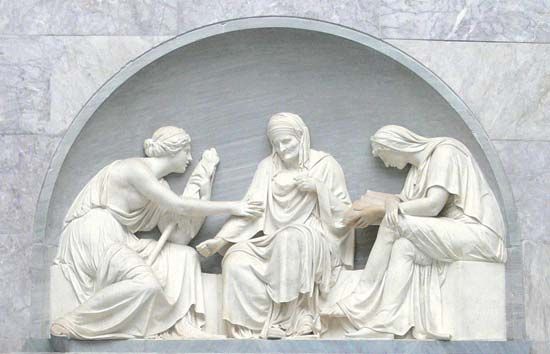Fate
Our editors will review what you’ve submitted and determine whether to revise the article.
- Mythopedia - Moirae
- Theoi Greek Mythology - Moirai
- World History Encyclopedia - Fates
- Mythology.net - The Fates (Moirai)
- Ancient Origins - The Three Fates: Destiny’s Deities of Ancient Greece and Rome
- PBS - The Fates: Greek Mythology's Most Powerful Deities
- Roman and Greek Gods - The Three Fates
- Perseus Digital Library - A Dictionary of Greek and Roman biography and mythology - Moira
- CORE - The Three Sisters in the Ge-sar Epic
- University of Michigan Library Digital Collections - The Encyclopedia of Diderot & d'Alembert Collaborative Translation Project - Fates
- Greek:
- Moira
- Plural:
- Moirai
- Latin:
- Parca
- Plural:
- Parcae
- On the Web:
- PBS - The Fates: Greek Mythology's Most Powerful Deities (Oct. 18, 2024)
Fate, in Greek and Roman mythology, any of three goddesses who determined human destinies, and in particular the span of a person’s life and his allotment of misery and suffering. Homer speaks of Fate (moira) in the singular as an impersonal power and sometimes makes its functions interchangeable with those of the Olympian gods. From the time of the poet Hesiod (8th century bc) on, however, the Fates were personified as three very old women who spin the threads of human destiny. Their names were Clotho (Spinner), Lachesis (Allotter), and Atropos (Inflexible). Clotho spun the “thread” of human fate, Lachesis dispensed it, and Atropos cut the thread (thus determining the individual’s moment of death). The Romans identified the Parcae, originally personifications of childbirth, with the three Greek Fates. The Roman goddesses were named Nona, Decuma, and Morta.












